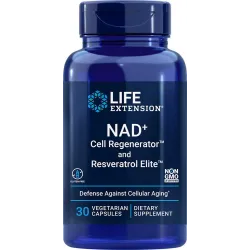
56,47 €
Quantity:
Total:
Total products:
Total shipping: To be determined
Total:
Science-based food supplements
Manufacturer: Life Extension
In stock
| Quantity | Price | You Save |
|---|---|---|
| 2 | 12,14 € | Up to 1,01 € |
| 4 | 11,89 € | Up to 3,04 € |
By buying this product you can collect up to 12 loyalty points. Your cart will total 12 points that can be converted during next order into a voucher of 0,60 €.

TMG
500 mg, 60 liquid vegetarian capsules
Item Catalog Number: 01859
Trimethylglycine (TMG) is also called glycine betaine, but the name trimethylglycine signifies that it has three methyl groups attached to each molecule of glycine. TMG was discovered to be beneficial to heart health back in the 1950s.1-5 TMG operates along a pathway similar to that of vitamin B12. It is a “methyl donor,” providing extra methyl groups to hasten the conversion of homocysteine back to methionine.6 When a TMG methyl group is donated to a molecule of homocysteine, it converts to the non-toxic amino acid, methionine.7,8 Research showing TMG’s ability to promote healthy levels of homocysteine, alone or in conjunction with other nutrients, confirms its status as an important nutrient for cardiovascular health.9-17 For example, in a recent cross-sectional survey study, participants who consumed >360 mg/d of TMG had, on average, 10% lower concentrations of homocysteine and 19% lower concentrations of C-reactive protein than those participants who consumed <260 mg/d.18
Serving Size 2 vegetarian liquid capsules
Servings Per Container 30
| Amount Per Serving | |
|---|---|
| Trimethylglycine (TMG) (as betaine anhydrous) | 1000 mg |
| Other ingredients: glycerin, vegetable cellulose (capsule), purified water. | |
Dosage and Use
Take two (2) capsules in the morning with or without food, or as recommended by a healthcare practitioner.
TMG should be taken with co-factors B6, B12, and folic acid.
Caution
If muscle tension or headaches occur, reduce the dose or discontinue product, and inform your physician if they do not subside.
Warnings
KEEP OUT OF REACH OF CHILDREN
DO NOT EXCEED RECOMMENDED DOSE
Do not purchase if outer seal is broken or damaged.
When using nutritional supplements, please consult with your physician if you are undergoing treatment for a medical condition or if you are pregnant or lactating.
When the methyl group of TMG attaches to a homocysteine molecule, this is converted into a non-toxic amino acid, methionine. Research confirms TMG's ability to support normal homocysteine levels, either alone or in combination with other nutrients, and TMG's status as an important nutrient for cardiovascular health has been confirmed. For example, in a recent cross-sectional survey study, participants who consumed> 360 mg / day of TMG had an average 10% lower homocysteine and 19% lower levels of C-reactive protein than those who consumed <260 mg / day TMG.
Trimethylglycine (TMG) is also called glycine betaine, but trimethylglycine means that it has three methyl groups attached to each glycine molecule. In the 1950s, TMG was found to be beneficial for heart health. TMG works in a pathway similar to that of vitamin B12. This is the "methyl donor" that provides additional methyl groups to accelerate the conversion of homocysteine back to methionine.